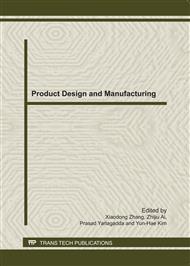[1]
Jean P L. Jérome B. Michel B. et al. A Navigation Aided Intelligent Cruise Control System[J]. SAE Paper No.2000-01-1300.
Google Scholar
[2]
Vahidi A, Eskandarian A: Research Advances in Intelligent Collision Avoidance and Adaptive Cruise Control. IEEE Transactions on Intelligent Transportation Systems. Vol.4 (2003), pp.143-153
DOI: 10.1109/tits.2003.821292
Google Scholar
[3]
Bin Yang. Qiang Ke. Xiaomin Li. et al: Longitudinal acceleration tracking control of vehicular stop-and-go cruise control system. IEEE Networking, Sensing and Control. Vol. 5 (2004), pp.607-612.
DOI: 10.1109/icnsc.2004.1297508
Google Scholar
[4]
Christoph Mayser. Karl Naab. Walter Kagerer: InterActive Cruise Control - A New Driver Interaction Concept for Adaptive Cruise Control Systems. SAE Paper No.2006-01-0346.
DOI: 10.4271/2006-01-0346
Google Scholar
[5]
Jarrah M A, Shaout A: Fuzzy Modular Autonomous Intelligent Cruise Control(AICC) System. Journal of Intelligent and Fuzzy Systems. Vol. 3-4 (2001), P.121-134
Google Scholar
[6]
Yinong Li, Jie Ji, Ling Zheng, Shu'en Zhao: Modeling and Simulation of Adaptive Cruise Control System for Intelligent Vehicles. China Mechanical Engineering. Vol. 6 (2010), pp.1374-1381. (In Chinese)
Google Scholar
[7]
Charles D. Pierre L G. Julien L. et al.: Architecture and Design of a Multi-Layered Cooperative Adaptive Cruise Control System. SAE Paper No.2007-01-1315
Google Scholar
[8]
Osman, K. Rahmat, M.F. Ahmad, M.A: Modelling and controller design for a cruise control system.IEEE Signal Processing & Its Applications, Vol. 3 (2009), p.254 – 258
DOI: 10.1109/cspa.2009.5069228
Google Scholar
[9]
Dawei Pi, Nan Chen, Bingjun Zhang: Research on Simulation of Fuzzy Control of Antilock Braking System Based on Finite State Machine Theory. Journal of System Simulation. Vol. 8 (2009), pp.4961-4965(In Chinese)
Google Scholar
[10]
Hongxing Li: Adaptive Fuzzy Controller Based on variable Universe. Science in China,Ser.E, Vol. 1 (1999), p.32—42 (In Chinese)
Google Scholar
[11]
Benalie, N. Pananurak, W. Thanok, S. et al.: Improvement of adaptive cruise control system based on speed characteristics and time headway. IEEE Intelligent Robots and Systems, Vol. 10 (2009), pp.2403-2408
DOI: 10.1109/iros.2009.5353922
Google Scholar
[12]
Yibin Li, Jiuhong Ruan, Caihong Li: LONGITUDINAL MOTION CONTROL OF INTELLIGENT VEHICLE. Chinese Journal of Mechanical Engineering, Vol.11 (2006), pp.94-102(In Chinese)
DOI: 10.3901/jme.2006.11.094
Google Scholar


